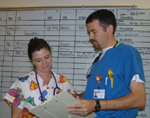Not just an ER, an entire department for child emergencies
by Susan Kammeraad-CampbellBusiness Development and Marketing Services
“There’s almost no similarity between the medical care of adults and the medical care of children,” said Rebecca Reamy, M.D., medical director of the MUSC Children’s Hospital Emergency Department. “Children’s bones break differently, and fevers mean something very different in children than adults. The difference between a fever in a newborn and a fever in a teenager is just as vast.”
 Pediatric
ER physician Dr. Brett MacLean reviews a chart with Tressa Heinen, R.N.
Pediatric
ER physician Dr. Brett MacLean reviews a chart with Tressa Heinen, R.N.
The Emergency Department at MUSC Children’s Hospital is 100 percent about children. The knowledge the team brings to any equation—the team’s currency with proper dosages, new drugs, immunization schedules, and working with instruments and equipment especially designed for children—translates to better care.
Most emergency departments provide general care for patients from infants to the elderly. That means anyone of any age will be seen there. Only about 25 percent of all patients who enter a community hospital emergency department are children. Physicians and nurses must be able to shift from one type of patient to another.
“Because my sole focus is children, I have a comfort level making a diagnosis that often doesn’t require subjecting a child to a battery of uncomfortable tests and X-rays,” Reamy said. “The tests can be unnerving for a child. They also add time and expense. Sparing a child an unnecessary test can be a tremendous relief for everyone.”
But if a child requires serious intervention, MUSC Children’s Hospital has every available pediatric service and subspecialty there is.
MUSC Children’s Hospital has gone out of its way to create an environment devoted to children. Every room, every wall, every television was placed with children in mind. Patients are seen in private rooms, each equipped with its own monitoring equipment.
The new MUSC Pediatric Emergency Department, which opened in January, is the only one of its kind in the state. With nine beds, it has nearly doubled in size, allowing patients to move to exam rooms faster. It also has its own entrance and is completely separate from adult services.
The Emergency Department at MUSC Children’s Hospital is 100 percent about children.
The new emergency department is designed to create a child-friendly environment. Among the features are private patient rooms, each colorfully decorated to follow a different theme including animals, fish, and boats. Every room is also equipped with a TV, VCR, and DVD player. Another child-friendly feature is the presence of child life specialists, who help ease the fears of young patients and make them feel more comfortable.
The MUSC Pediatric Emergency Department is prepared to handle everything from minor emergencies such as fever, ear infections, minor cuts and sprains, to life-threatening injuries and illnesses. All exam rooms in the department are fully equipped for emergencies, and each patient room has a cardiac monitor wired to the nurses’ station at all times.
“Our nurses have highly specialized training in pediatric care,” said Debbie Browning, R.N., nurse manager of Children’s Services. “They have completed either the Pediatric Advanced Life Support coursework or the Emergency Nurses Pediatric course, the gold standard for pediatric nurses.”
MUSC Children’s Hospital, which opened its pediatric emergency unit in 1999, has the region’s only dedicated pediatric intensive care unit and pediatric cardiac intensive care unit. MUSC offers the highest level of neonatal intensive and trauma care and the state’s only pediatric burn center.
For more information about MUSC Children’s Hospital and its services, call MUSC Health Connection at 792-1414.
Friday, Aug. 13, 2004
Catalyst Online is published weekly, updated
as needed and improved from time to time by the MUSC Office of Public Relations
for the faculty, employees and students of the Medical University of South
Carolina. Catalyst Online editor, Kim Draughn, can be reached at 792-4107
or by email, catalyst@musc.edu. Editorial copy can be submitted to Catalyst
Online and to The Catalyst in print by fax, 792-6723, or by email to petersnd@musc.edu
or catalyst@musc.edu. To place an ad in The Catalyst hardcopy, call Community
Press at 849-1778.